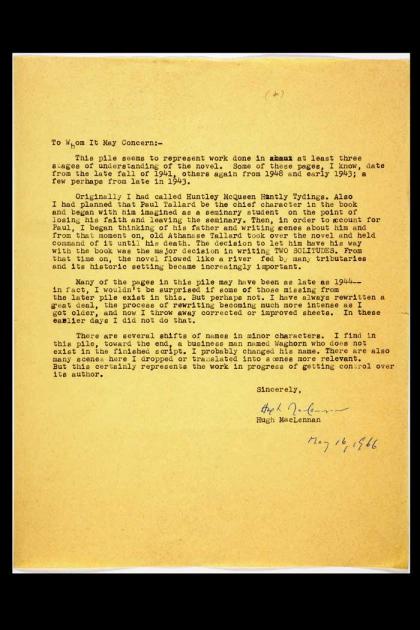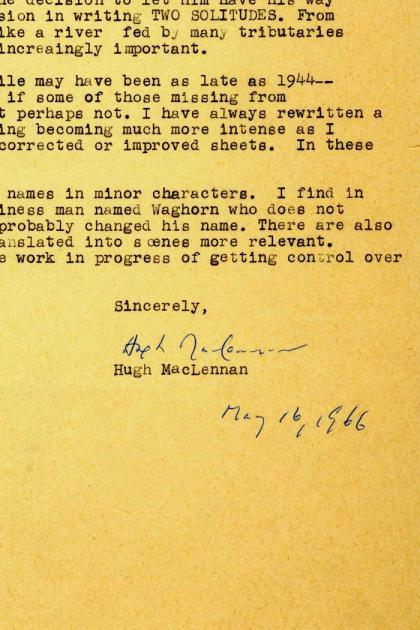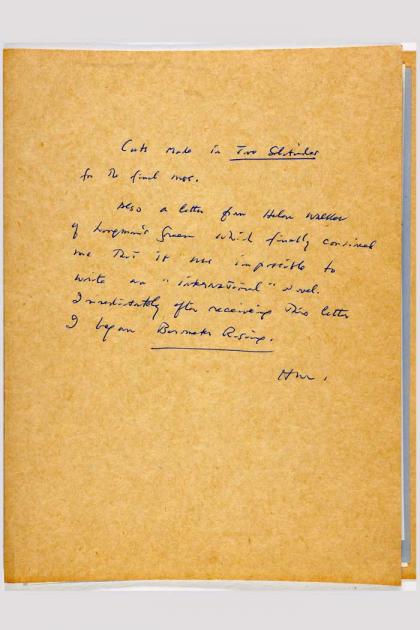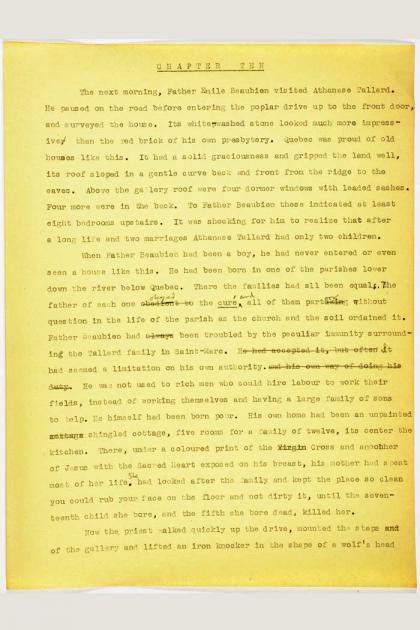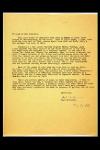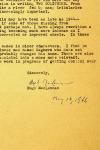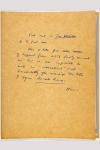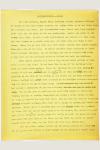Two Solitudes Papers
Organization: Rare Books and Special Collections, McGill University Library
Coordinates: www.mcgill.ca/library/library-using/branches/rarebooks
Address: 3459 McTavish Street, Montreal, QC H3A 0C9
Region: Montreal
Contact: Sharon Rankin, Liaison Librarian, sharon.rankin(a)mcgill.ca
Description: Typewritten manuscript and drafts of the book Two Solitudes by Hugh MacLennan, related correspondence, lists of cuts and corrections, in the form of loose leaf papers in nine folders, in a box of MacLennan’s writings.
Year made: Late fall of 1941 to 1948
Made by: Hugh MacLennan
Materials/Medium: Paper
Colours: yellow and blue
Provenance: North Hatley, Quebec
Size: 31 cm x 23 cm x approx. 12 cm thick
Photos: Courtesy Rare Books and Special Collections, McGill University Library
Two Solitudes Protect and Touch
(la version française suit)
Graham Fraser
The title of this essay is a reference to the original lines by Rainer Maria Rilke, from which Hugh MacLennan took the title of his famous novel. The full quotation is: “Love consists in this, that two solitudes protect and touch and greet each other.” (Rainer Maria Rilke, Letters to a Young Poet, letter no. 7 dated May 14, 1904)
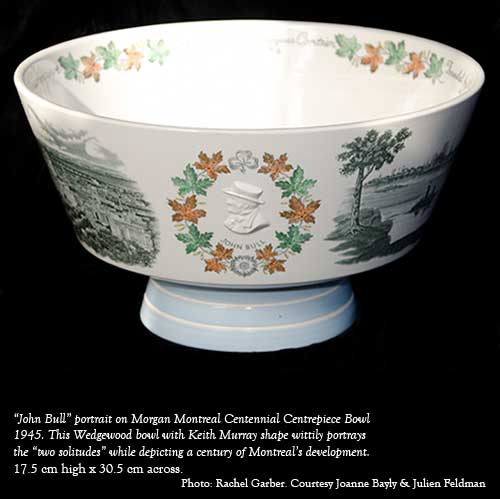
If you look up “two solitudes” in Wikipedia, you will see the following comment: “Two Solitudes refers to a perceived lack of communication and moreover a lack of will for communication between Anglophone and Francophone people in Canada.” And that is certainly the way the phrase has come to be understood. MacLennan was always very disappointed that the title of his novel had become a symbol of division, of the distance between French and English in Canada, rather than a symbol of unification, because the original quotation from the Rilke letter referred to an intimate relationship. And that was very definitely Hugh McLennan’s view of the relationship between the French and English in Canada.
MacLennan was part of a group of friends that included my father, F.R. Scott and Mason Wade, the American historian of French Canada. In August 1943, Wade, who was then working on his ground-breaking one-volume history called The French Canadians, told his friends in North Hatley that Henri Bourassa was speaking in Magog on behalf of a Bloc populaire candidate in the Stanstead by-election. Bourassa was about to turn 75, and it would be one of the last opportunities to hear this extraordinary figure in Canadian history. So they all headed over to see him.
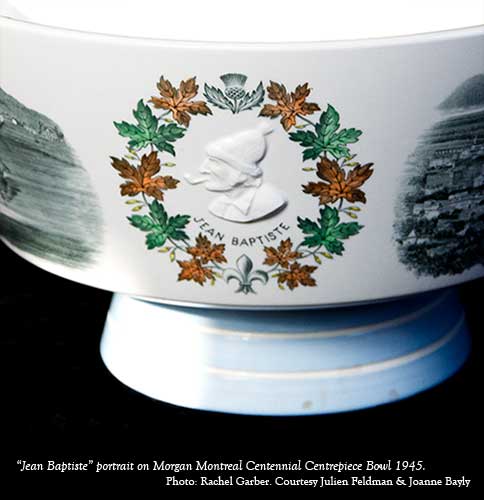
As MacLennan recounted to me almost 40 years later, “Bourassa was introduced by a man with blazing eyes, a lock of hair, a high voice filled with passion and hatred. I said to Wade, ‘Who in the hell is that?’ ‘That’s André Laurendeau.’ ‘That’s amazing. I just put him in a book and mailed him to New York a week ago.’ (Quoted in “The Last Saga of Hugh MacLennan,” The Globe and Mail, May 18, 1985, p. B1.)
To MacLennan, it was the shock of recognition: he had seen in André Laurendeau the personification of Marius Tallard, one of the major protagonists in his new novel, Two Solitudes. The two men did not meet then, but five years later, Laurendeau sent MacLennan a copy of a children’s book he had written, inscribed “D’une solitude à l’autre.”
Twenty years after that speech in Magog, the group of friends were all playing important roles in shaping Canada’s linguistic landscape. Mason Wade’s seminal work on French Canada was translated into French. F.R. Scott became a commissioner of the Royal Commission on Bilingualism and Biculturalism and, of course, André Laurendeau was the co-chair of that same Royal Commission, whose main recommendations formed the basis of the Official Languages Act.
Deux solitudes qui se protègent et se rejoignent
Graham Fraser
Le titre de cet essai est tiré d’un poème de Rainer Maria Rilke, dont Hugh MacLennan s’est inspiré pour le titre de son célèbre roman. La citation intégrale est : « L’amour consiste en ceci : deux solitudes qui se protègent, se rejoignent, et s’ouvrent l’une à l’autre. » (Cité dans Lettres à un jeune poète, de Rainer Maria Rilke, lettre no 7 datée du 14 mai 1904.)
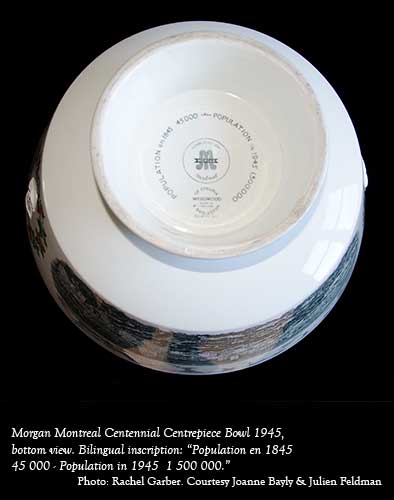
Selon Wikipédia, l’expression « deux solitudes » fait allusion au manque de communication perçu entre les francophones et les anglophones du Canada et à leur manque de volonté à cet égard. C’est sans aucun doute de cette façon que l’expression est généralement comprise. MacLennan a toujours été profondément déçu du fait que le titre de son roman soit devenu un symbole de la distance entre les francophones et les anglophones du Canada plutôt qu’un symbole d’unification, car le poème de Rilke faisait au contraire allusion à une relation intime. C’était indéniablement la façon dont Hugh McLennan percevait les relations entre les francophones et les anglophones du Canada.
MacLennan avait un groupe d’amis dont mon père, F.R. Scott, et Mason Wade, l’historien américain spécialiste du Canada français. En août 1943, Wade, qui travaillait alors sur son ouvrage historique précurseur intitulé Les Canadiens français, a informé ses amis de North Hatley qu’Henri Bourassa prononcerait un discours à Magog au nom d’un candidat du Bloc populaire à l’élection partielle de Stanstead. Bourassa approchait de ses 75 ans, et ce serait l’une des dernières occasions d’entendre ce personnage important de l’histoire canadienne. Ils se sont donc mis en route pour aller l’écouter.
« Bourassa a été présenté par un homme, la mèche sur le front, aux yeux étincelants et à la voix haut perchée remplie de passion et de haine », m’a dit MacLennan presque 40 ans plus tard et de continuer: «J’ai dit à Wade: “Bon sang, c’est qui ce type?” “C’est André Laurendeau” “C’est incroyable! Je viens juste de le mettre dans un livre que j’ai posté à New York il y a une semaine.» (Cité dans «The Last Saga of Hugh MacLennan», The Globe and Mail, 18 mai 1985, p. B1.)
Pour MacLennan, cela avait été un choc : il avait devant lui, en chair et en os, son personnage Marius Tallard, l’un des principaux protagonistes de son nouveau roman intitulé Deux solitudes. Les deux hommes ne se sont pas rencontrés à cette occasion, mais cinq ans plus tard, Laurendeau a envoyé à MacLennan un exemplaire du livre pour enfants qu’il venait d’écrire, avec la dédicace : « D’une solitude à l’autre ».
Vingt ans après le discours prononcé à Magog, les membres du groupe d’amis jouaient tous un rôle important dans le façonnement du paysage linguistique du Canada. L’ouvrage précurseur de Mason Wade sur le Canada français a été traduit en français; F.R. Scott était devenu commissaire à la Commission royale d’enquête sur le bilinguisme et le biculturalisme et, bien sûr, André Laurendeau était coprésident de cette même Commission, dont les principales recommandations ont constitué le fondement de la Loi sur les langues officielles.
Hugh MacLennan n’a pas seulement écrit le roman Deux solitudes. Il a poursuivi ses travaux journalistiques en écrivant sur l’importance du bilinguisme, l’importance d’avoir des écoles de langue minoritaire en français partout au pays et l’importance d’apprendre les deux langues officielles du Canada.
To Learn More
Canada Reads CBC Radio, http://www.cbc.ca/news/arts/story/2013/02/14/canada-reads-turf-wars-fina...
CBC Radio, http://www.cbc.ca/books/booksandauthors/2012/10/two-solitudes/index.html
Graham Fraser, “Two solitudes protect and touch: On creating communities: Notes for a speech at the Unitarian Church in North Hatley,” July 15, 2012: http://www.ocol-clo.gc.ca/html/speech_discours_15072012_e.php
Hugh MacLennan, Two Solitudes, 1945.
Hugh MacLennen Fonds, http://www.ucalgary.ca/lib-old/SpecColl/maclenh.htm
Author
Graham Fraser is Canada’s Commissioner of Official Languages and author of several books, including Sorry, I don’t Speak French (2006).
Notes on the Two Solitudes Papers
These typewritten and extensively revised drafts of the book Two Solitudes and related correspondence reflect Hugh MacLennan’s many years of creative thinking and discussion. The papers date from late 1941 to 1948, although the book itself was published in 1945. Two Solitudes is a novel that is often described as a literary allegory for tensions between English and French Canada. MacLennan himself was born in 1907 in Nova Scotia, and moved as an adult to Quebec. He was a professor at McGill University, and spent many summers in North Hatley, Quebec. Two Solitudes was the second of his seven published novels.
In the Two Solitudes papers is found this passage about the writing of the book. It is in a letter written by Hugh MacLennan, dated May 16, 1966:
“Old Athanase Tallard took over the novel and held command of it until his death. The decision to let him have his way with the book was the major decision in writing Two Solitudes. From that time on, the novel flowed like a river fed by many tributaries and its historic setting became increasingly important.”


